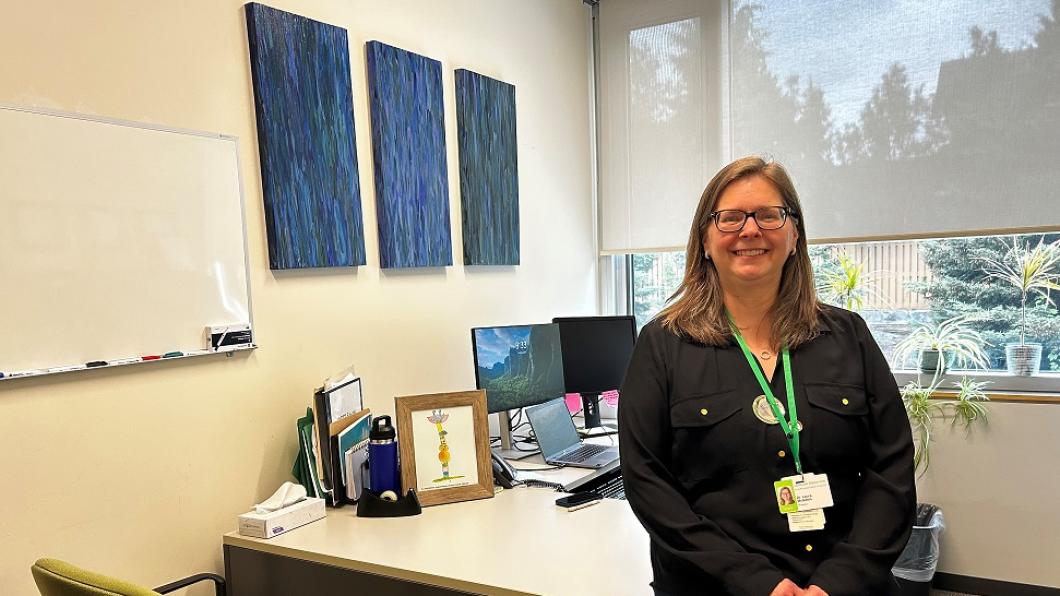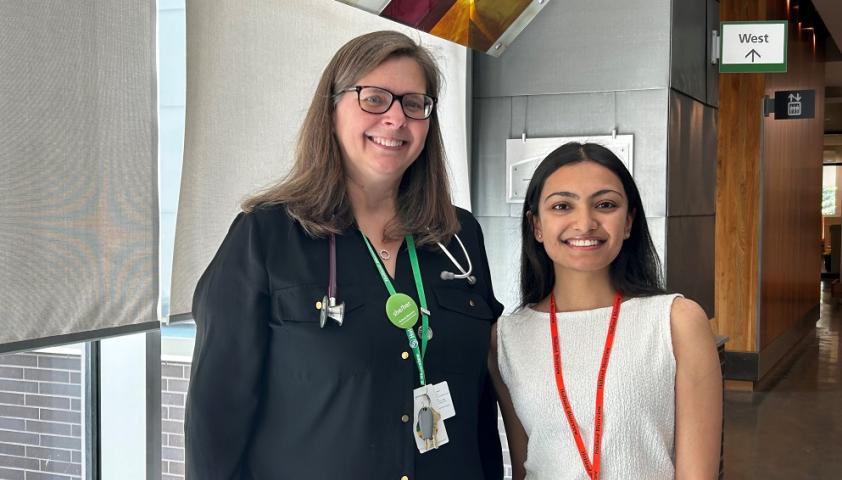
Physician reflects on her journey as an educator, clinician and researcher as a newly minted associate professor
Walk into Dr. Laura McAdam’s office and your eye is immediately drawn to the abstract paintings above her desk. “I’m late to do art,” the physician laughs. “I’ve started painting five or six years ago. It relaxes me and gives me a creative outlet.”
That creativity extends well beyond the canvas.
As an educator, clinician and researcher, she brings imagination, innovation and compassion to every facet of her work. “It’s the full spectrum of creativity – academic, clinical and personal. It helps to balance me.”
From her first foray into the world of pediatric disability care as a summer medical student at Holland Bloorview, to her current roles as a physician, director of ambulatory services at Holland Bloorview and a clinical investigator at the Bloorview Research Institute, she has always kept clients and families at the heart of her work.
Now, as an associate professor in the Department of Paediatrics at the University of Toronto’s Temerty Faculty of Medicine, she is mentoring the next generation of clinicians -- some in the very same program she was in as a student. It’s a full circle moment for a physician and researcher who intentionally leads from both the head and heart.
Q & A
What does this academic promotion mean to you?
It’s a really proud moment that reflects the evolution of my career as a pediatrician, researcher and educator. It also acknowledges the many small building blocks – connections with clients and families, community advocacy groups and research – that brought me here.
For those who aren’t familiar with your work, what are your clinical and research foci?
Clinically, I specialize in rare genetic conditions, specifically neuromuscular conditions and Rett syndrome. I lead the multidisciplinary neuromuscular and Rett Syndrome clinics at Holland Bloorview.
My research focuses on three areas: enhancing care for children with neuromuscular conditions, advancing rehabilitation for children with rare diseases and examining the broader impacts of rare conditions.
I also collaborate nationally and internationally to improve care and advocacy for individuals with Duchenne Muscular Dystrophy (DMD).
Tell me your first foray into pediatric disability care?
After my second year of medical school, I joined the summer medical student program at Holland Bloorview. It was a foundational moment for me. I always knew I was interested in pediatrics, but this program opened my eyes to pediatric disability care and the power of client- and family-centred, strength-based care approaches. I also saw the incredible passion that clinicians brought to their work with families.

What guides your clinical and research work?
A continuous passion for helping families and integrating their priorities into care. Many of my research projects stem from clinical conversations with families. For example, I’m currently working with Salony Sharma, a summer research student, on a project exploring differences in how youth and their parents perceive bullying—an issue that emerged directly from clinical interactions and family discussions.
Can you talk about your work with advocacy groups?
Partnering with national advocacy groups is vital. They play a key role in education and government advocacy. I’ve worked closely with Defeat Duchenne Canada, contributing to their conferences and collaborating on research. One project on bullying included a developmental fellow and a family leader, highlighting the importance of community connections in academic work. This led to a collaborative presentation co-developed with a parent at DDC’s annual conference focusing on resiliency.
Looking ahead, what changes would you like to see in supporting children with rare disease and neuromuscular conditions?
I’m part of several international collaborations including OPTIMIZE DMD, which aims to advance better outcomes for individuals with Duchenne Muscular Dystrophy.
What I’m seeing is a positive shift from focusing solely on the genetic condition to addressing broader aspects of care, including psychosocial impacts. For example, one treatment for DMD can lead to short stature and increased appetite, which may result in obesity. Understanding these trickle-down effects and grounding our working in the lived experiences of youth and families is essential.
What learnings do you hope to impart to your students?
My journey has been driven by a single, enduring belief that the voices of children and their families is the compass that guides my clinical practice, research and advocacy. Every clinic visit, every conversation with a client and caregiver, and every story of resilience has shaped my path.
My work is not just about advancing treatments; it’s about advancing humanity in medicine.
To the next generation: my thoughts are to let curiosity lead you and let compassion anchor you. Together, let’s redefine what is possible for every child, every family and every community.
Congratulations, Dr. McAdam!